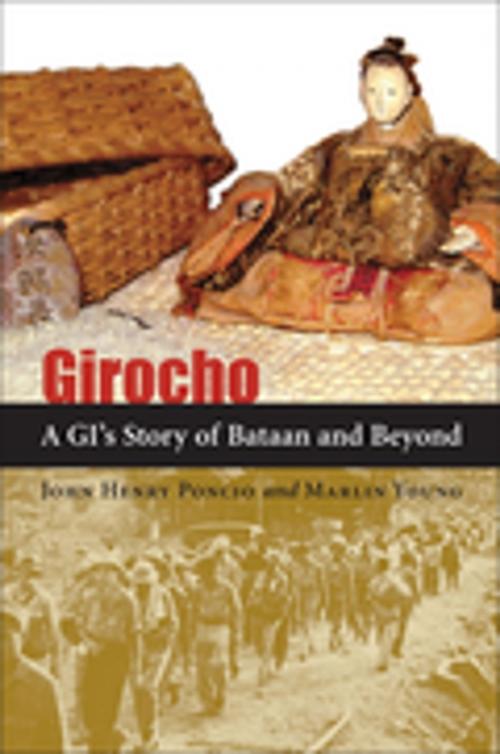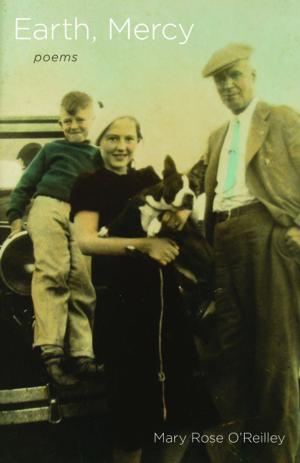| Author: | John Henry Poncio, Marlin Young | ISBN: | 9780807165195 |
| Publisher: | LSU Press | Publication: | May 1, 2003 |
| Imprint: | LSU Press | Language: | English |
| Author: | John Henry Poncio, Marlin Young |
| ISBN: | 9780807165195 |
| Publisher: | LSU Press |
| Publication: | May 1, 2003 |
| Imprint: | LSU Press |
| Language: | English |
After surviving the brutal Bataan Death March in spring 1942, Louisiana native John Henry Poncio spent the remainder of World War II as a Japanese prisoner, first at Camp Cabanatuan in the Philippines and later at Hirohata in Japan. In those three and a half years, U.S. Army Air Corps sergeant Poncio suffered severe beatings, starvation, disease, and emotional and psychological abuse at the hands of his captors. However, his resiliency, sense of humor, and cunning helped him to persist and to recover from the traumatic events without rancor toward the Japanese. In Girocho, he relates his experiences as a POW with touching honesty, vividly describing the harsh conditions he and his comrades endured as well as the sometimes-funny clashes with Japanese culture.
Girocho was a samurai who stole from the rich and gave to the poor, a Japanese Robin Hood. Early on, Poncio was given this name in jest by one of the prison guards, and it suited him perfectly. During his internment, he took part in a vast smuggling operation that brought food, money, mail, and other supplies into the POW camps; he reported enemy troop movements to Filipino guerrillas and participated in acts of sabotage. He and the other prisoners worked together incessantly to subvert the Japanese war effort even under the threat of death, going so far as to bury expensive calibration equipment in wet cement and build irregular gears for planes. To frustrate their captors and to stay alive, the American POWs developed the technique “going Asiatic” — maintaining a blank expression during interrogations and beatings and escaping mentally for a time. Although he and his fellow captives were treated with cruelty by many, Poncio recalls the camaraderie of the prisoners and encounters with humane guards and kind civilians, proving his remarkable gift for finding the positive in the most dire of situations.
Girocho is an inspiring memoir, transcribed verbatim by Poncio’s wife, Inez, from nine hours of cassettes Poncio recorded some years after the war. Marlin Young verified her uncle’s stories, placed them in chronological order, and set them within the greater context of the war, creating a compelling tale of one soldier’s courage, honor, and resolve to overcome life as a prisoner of war. Their book is a fitting tribute to the POWs in the Pacific, who fought in their unique way for the U.S. war effort, their friends, and their very lives.
After surviving the brutal Bataan Death March in spring 1942, Louisiana native John Henry Poncio spent the remainder of World War II as a Japanese prisoner, first at Camp Cabanatuan in the Philippines and later at Hirohata in Japan. In those three and a half years, U.S. Army Air Corps sergeant Poncio suffered severe beatings, starvation, disease, and emotional and psychological abuse at the hands of his captors. However, his resiliency, sense of humor, and cunning helped him to persist and to recover from the traumatic events without rancor toward the Japanese. In Girocho, he relates his experiences as a POW with touching honesty, vividly describing the harsh conditions he and his comrades endured as well as the sometimes-funny clashes with Japanese culture.
Girocho was a samurai who stole from the rich and gave to the poor, a Japanese Robin Hood. Early on, Poncio was given this name in jest by one of the prison guards, and it suited him perfectly. During his internment, he took part in a vast smuggling operation that brought food, money, mail, and other supplies into the POW camps; he reported enemy troop movements to Filipino guerrillas and participated in acts of sabotage. He and the other prisoners worked together incessantly to subvert the Japanese war effort even under the threat of death, going so far as to bury expensive calibration equipment in wet cement and build irregular gears for planes. To frustrate their captors and to stay alive, the American POWs developed the technique “going Asiatic” — maintaining a blank expression during interrogations and beatings and escaping mentally for a time. Although he and his fellow captives were treated with cruelty by many, Poncio recalls the camaraderie of the prisoners and encounters with humane guards and kind civilians, proving his remarkable gift for finding the positive in the most dire of situations.
Girocho is an inspiring memoir, transcribed verbatim by Poncio’s wife, Inez, from nine hours of cassettes Poncio recorded some years after the war. Marlin Young verified her uncle’s stories, placed them in chronological order, and set them within the greater context of the war, creating a compelling tale of one soldier’s courage, honor, and resolve to overcome life as a prisoner of war. Their book is a fitting tribute to the POWs in the Pacific, who fought in their unique way for the U.S. war effort, their friends, and their very lives.















